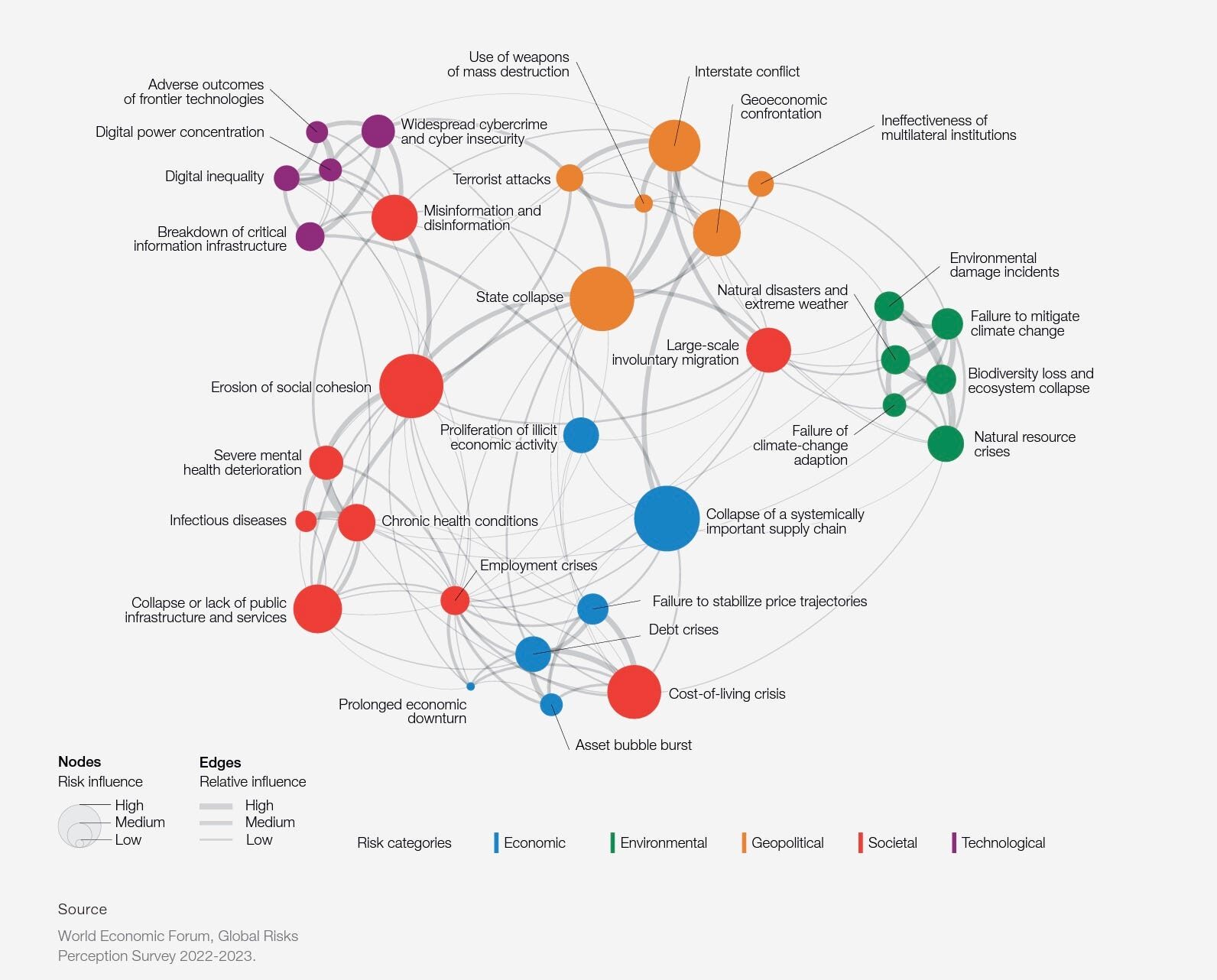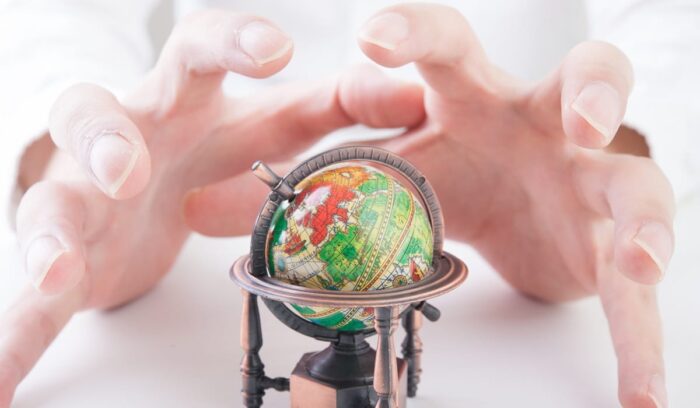Aspiring change leaders often undermine their purpose by trying to do too much. I’ve written about two ways this can happen in previous articles.
When we try to be the hero, we act as if one person alone must do something great and heroic to enact change. We give ourselves too much importance.
When we employ a “yes, and” approach, we pile so many roles and responsibilities on ourselves that we can’t focus on what matters most. We give ourselves too many priorities.
But there’s a third way we can try to do too much. We try to take on the whole wide world and all its problems. Our scope is too broad. We forget that simply tending to our own lives and making authentic human connections is almost always the most impactful thing we can ever do.
Understanding the meta-crisis
Humanity in the 21st Century is facing a seemingly endless stream of crises: the climate crisis, biodiversity loss, economic inequality, diseases of despair, pandemics, growing authoritarianism, terrorism, gun violence, runaway technological advancement, the erosion of shared knowledge and meaning, and much more. Together, these individual crises all complicate, exacerbate, and deepen one another, creating a knot of crises.

On top of all that, our experience of these crises is a crisis itself. Living with the troubling challenges of our world so often elicits anxiety, despair, and existential dread within us. This existential crisis then erodes our capacity to address the world’s more tangible challenges. As our capacity erodes, the problems intensify, and our existential crises deepen even further, and on and on. It’s the ultimate “wicked problem.”
Altogether these crises create what scholars, thinkers, and leaders are increasingly calling the “meta-crisis” – the knot of compounding crises understood as one whole.
Thinking of the world’s challenges through the lens of the meta-crisis has proven helpful. It encourages us to see the world from a much wider, holistic, and more nuanced perspective. We can more clearly see where an intervention might have unintended consequences in seemingly unrelated domains. Or, we might find ways to achieve positive gains across multiple challenges through one isolated intervention.

Finding such elegant, widely impactful interventions is now something of a holy grail for social change. Arguably, we can no longer afford to tackle challenges in isolation. We must find a way to reckon with the meta-crisis itself.
Reckoning with the meta-crisis
Aspiring change leaders now more than ever are oriented around and even consumed by the meta-crisis or similar heady, global framings.
The pattern perhaps goes something like this. Somehow people get turned on to these big-picture ideas. Maybe they read a Ken Wilber or Donella Meadows book. Or maybe they take some LSD and get their minds blown open. One way or another, they see the immensity and complexity of the challenges facing humanity. They sense a growing existential dread within themselves, not only about our possible impending doom, but their complicity in it. They yearn to do something meaningful that truly contends with this immensity and complexity.

And so they quit their job and set out to write a book with some grand narrative about humanity. Or they try to build a DAO that revolutionizes how humans engage and collaborate. Or they try to establish a radical alternative blockchain economy. Or they launch a new community or company built on a new paradigm. One way or another, they do something big, risky, and audacious.

I love these kinds of people. But in my experience, this path is littered with folly. Too often, it only deepens our experience of existential dread and despair. And it’s rarely as impactful as we hope.
We often assume that to solve the big, heady problems facing humanity today we need big, heady solutions. And so we come up with grander, headier, and more audacious remedies – radical new technologies, radical new economies, radical new philosophies, radical new organizations, etc.

But these solutions are quite often too audacious for their own good. In our quest to usher in a new world, our solutions grow foolishly detached from the world we actually live in. We struggle to find funding. We struggle to cultivate an audience or customers. We struggle to flesh out and articulate our ideas. We are five steps ahead of the world around us. And as a consequence, we go broke and fall deeper into despair.
I think we can let our contributions be much simpler.
The most impactful thing in the world
I choose to believe that, at its core, the meta-crisis is not a failure of the head but of the heart.
One of the core features of modern culture is its insistence that we prioritize our heads and intellect at the expense of our hearts and feeling. As a result, our global systems and solutions are obssessed with data, research, analysis, efficiency, optimization, strategy, and cold-hearted calculus.
This focus has of course led to many important breakthroughs and achievements in technology, medicine, and beyond. But it has also arguably fostered cultures of rampant heartlessness, greed, and apathy. And it’s perhaps these phenomena that are at the root of so many of the problems we seek to remedy: the climate crisis, economic inequality, diseases of despair. For the most part, we already know how to solve most of our biggest problems. We simply aren’t willing to do it.
Because of that, perhaps the most strategic, elegant, all-encompassing contribution to the meta-crisis any of us can offer is simply showing up in our actual lives with more vulnerability, kindness, compassion, and courage. It’s making authentic human connections the very foundation of our lives and careers. It’s showing up to life with more heart.

This might mean healing ourselves to disrupt cycles of abuse and neglect. It might mean taking a job at Trader Joe’s to provide for our families. It might mean caring for our grandchildren when their parents are at work. It might mean fostering new cultures at the workplace one act of kindness at a time. Whatever it is, it does not have to be big, bold, and audacious. It doesn’t have to be strategic or cost-effective. It can just be whatever brings you into greater connection with yourself and your people.
When we open our hearts, we tap into the grace and compassion we need to freely offer whatever we can in service to the greater good. We create the relational pathways that allow energy to flow freely between us. And we inspire and enable others to do the same. When enough of us do this, we create vast networks through which we can distribute care, love, attention, knowledge, wisdom, and resources where they are needed most.
Don’t overthink it. To get straight to the heart of the meta-crisis, you can just go straight to your own heart. It really can be as simple as that, if you let it.

Peter Schulte
Purpose Coach
Bellingham WA, USA / Lummi & Nooksack lands
Purpose statement: I reveal a world of beauty and goodness